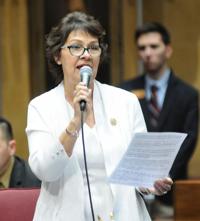PHOENIX — State senators refused to make it easier for a limited number of people to escape requirements to register as sex offenders amid concerns from some lawmakers that they have been prevented from voting on separate legislation to give victims of child sex abuse more time to sue their assailants.
On paper, HB 2613 deals only with those who were younger than 21 at the time they were arrested for offering to have sex with a teen ages 15, 16 or 17 who turned out to be a police officer. It says if there were no other offenses, the convicted person can ask a judge to remove the requirement to register as a sex offender when they turn 35.
But the proposal by House Speaker Rusty Bowers, R-Mesa, drew angry reaction from some lawmakers who questioned why they were being urged to help sex offenders — even those in these limited situations — while children who don’t realize they’ve been victimized are barred by Arizona law from bringing civil actions once they turn 20.
“Everything in my life is meant to help people not have to deal with that kind of trauma,” said Sen. Victoria Steele, D-Tucson.
“That’s the whole reason I’m in this Legislature,” she continued. “And if we can’t pass Mr. Boyer’s bill to expand the statute of limitations, then what the heck are we doing here?”
And Steele made the issue personal, saying she had been raped repeatedly as a child by her grandfather.
“I didn’t know it wasn’t my fault,” she told colleagues. “It wasn’t until I was in my 40s I realized I was not his only victim.”
Steele said that’s why she supports legislation sponsored by Sen. Paul Boyer, R-Phoenix, to give victims seven years from the time they are aware they have been victimized to file suit. And for those for whom the time to sue already has passed, his measure would now give them two more years.
But Boyer could not get a hearing in the Senate Judiciary Committee on his measure, SB 1255. That’s because Sen. Eddie Farnsworth, R-Gilbert, who chairs the panel, said he would allow it to be heard only if Boyer agreed to limit the scope of the bill so that child victims of sex abuse would have only until age 25 to sue.
That kept the bill from getting to the full Senate where there appear to be sufficient votes for the plan.
Senate Majority Leader Rick Gray, R-Sun City, urged colleagues not to quash the Bowers bill to create an escape from sex offender registration for some adults simply because they’re unhappy about being unable to vote on Boyer’s bill. He said there are legitimate reasons to support HB 2613.
“I don’t know about any of you,” Gray told colleagues. “When I was 20 I was a whole lot different than when I was 35.”
And Sen. Sylvia Allen, R-Snowflake, said it makes sense to allow someone to at least ask a judge to be removed from the requirement for lifetime registration as a sex offender.
“There should be some situations where people, after they’ve paid their price, be relieved of that,” she said.
Boyer, however, chided colleagues for trying to help those who who were convicted of trying to have sex with an undercover police officer.
“Meanwhile, we’re doing nothing to help child victims of sexual assault,” he said.
Boyer said the current statute of limitations in Arizona on cases of child sex abuse — two years from becoming an adult — is the lowest in the entire country.
By contrast, he said, in Utah the clock to sue starts running four years from the time someone knew or should have known they had been a victim. And the law in that state allows lawsuits until the victim turns 53.
And Boyer pointed out that the statute of limitations to file lawsuit over contract disputes in Arizona is six years.
“That means in Arizona we prioritize contracts over child victims of sexual assault,” he said.
Farnsworth argued he’s not defending those who prey on children. But he said allowing lawsuits to be filed almost perpetually means that people who are accused of events decades later can’t defend themselves because the evidence and the witnesses have disappeared.
“That’s why we have statutes of limitations, to defend innocent people, not guilty people,” Farnsworth said.
In the end, the Senate voted 18-11 to kill the Bowers’ bill.





